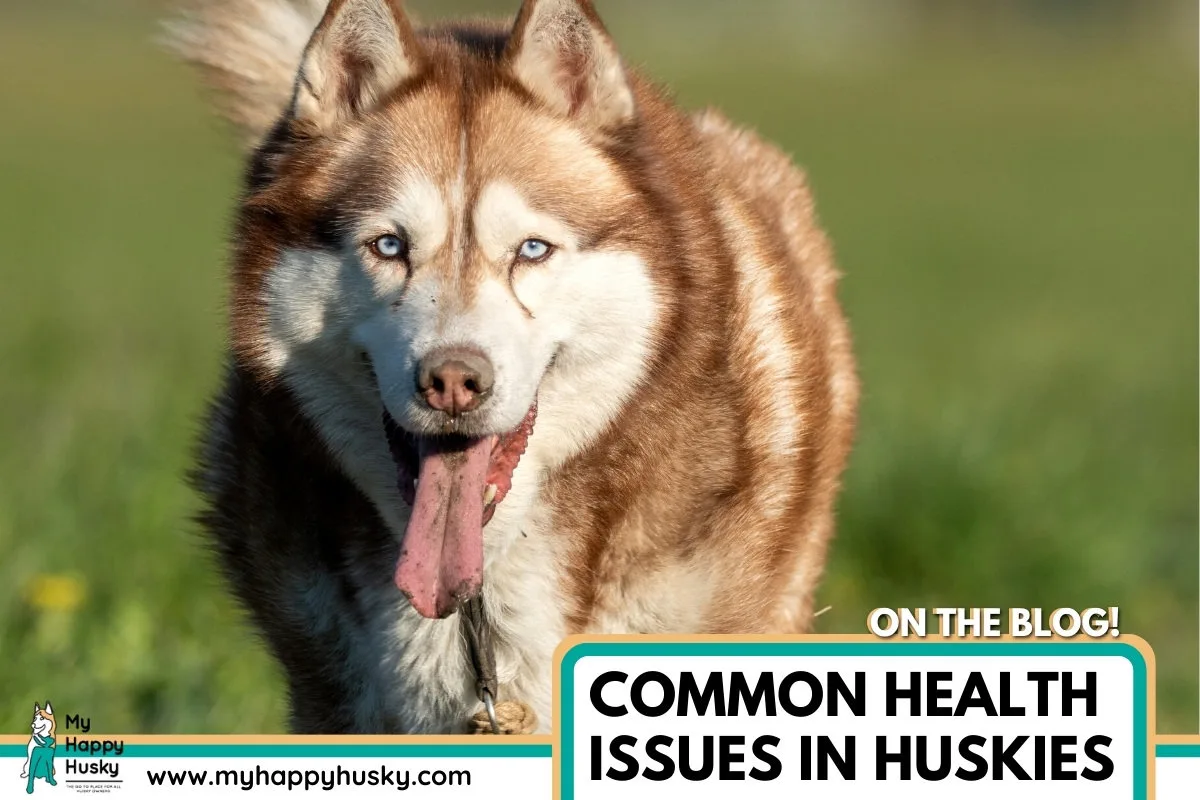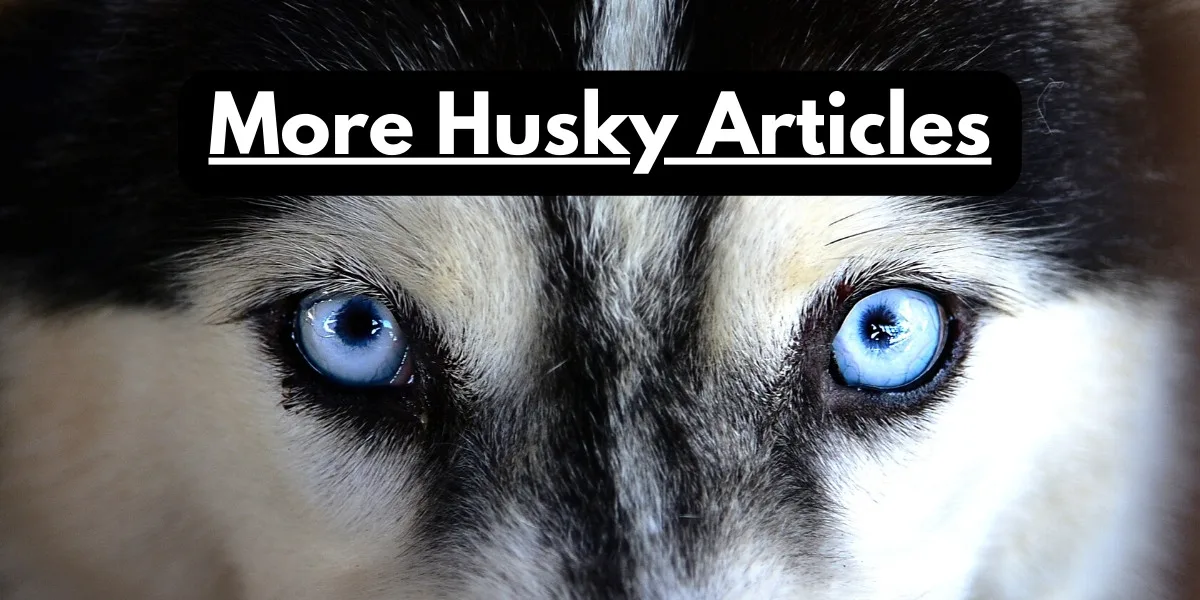Knowing which health issues your husky is most prone to is helpful. While we all hope these things never happen, sometimes we aren’t so lucky.
Let’s examine the most common health problems that Siberian huskies often develop.
This article doesn’t suggest every husky will develop these issues, and many huskies go on to live long, healthy lives.
5 Common Health Issues Affecting Siberian Huskies

Below I’ll briefly explain a little about each issue, as well as the typical symptoms and signs a husky will display.
Please remember that this is non-professional advice. If you’re currently trying to diagnose at home, it’s much better to consult your veterinarian should any of the symptoms below be present.
1. Hip dysplasia
A painful form of arthritis that’s very common in medium to large working breeds. Hip dysplasia affects many huskies and can happen in either old or young huskies.
Hip dysplasia is basically where the leg bone doesn’t properly fit into the hip bone. It should be a smooth ball and socket style joint, but with this condition, the joints do not fit together as they should.
Symptoms of hip dysplasia in huskies:
- Weakness in legs
- Dropped rear hind
- Reluctant to get up from a seated position
- Reluctant to climb stairs
- Limping
- General immobility
- Laying down all day
- Lethargy and lack of motivation
- Loss of muscle mass on the affected side
Can hip dysplasia be treated in huskies:
There is no way to properly “cure” hip dysplasia in dogs, but several options exist to help with the condition including:
- Surgery
- Tailored exercise program
- Physical therapy
- Joint supplements
- Anti-inflammatory medication
- Joint fluid modifiers
2. Eye problems
Various eye issues affect huskies including:
- Cataracts
- PRA (progressive retinal atrophy)
- Corneal dystrophy
These issues vary in severity, with some causing slight vision loss to total blindness. This is why it’s essential to have your husky’s eyes checked at least once per year.
It’s important to know that juvenile cataracts can develop from as early as three months, but most commonly happen between 6 months and 1 year old. This is why eye check-ups are crucial, especially early on.
Symptoms of eye problems in huskies:
- Cloudy film across the eye (cataracts)
- Bumping into things (PRA)
- Apprehensive going into dimly lit areas (PRA)
- Eyes become very reflective when light shines in the eye (PRA)
- Pawing at their eyes (all eye issues)
- Eye ulcer (corneal dystrophy)
- Changes in eye color (cataracts)
Can eye problems be resolved in huskies:
Solutions available depend on the specific issue, your husky’s age, and how long the condition has been left to develop. Some treatments include:
- Eye drops
- Antibiotic drops
- Antihistamines
- Surgery
- Saline washes
3. Thyroid issues
Huskies are prone to developing thyroid issues, most notably: Hypothyroidism.
This happens when your husky’s body doesn’t produce enough thyroid hormone. This is a serious issue, but thankfully it can be managed and does not negatively impact their lifespan.
Symptoms of hypothyroidism in huskies:
- Weight gain (without increased eating)
- Lethargy & laziness
- Dry skin
- Unhealthy hair loss (patchiness)
- Dull coat & excessive shedding
- Fearfulness
- Aggression
- Behavioral changes and mood swings
Treatment for hypothyroidism in huskies:
- Oral administration of thyroid replacement hormone can be the best treatment for huskies suffering from this condition.
4. Allergies
Huskies can develop allergies to certain substances, such as pollen, food, and chemicals, which can cause symptoms such as itchy skin, sneezing, and coughing.
Huskies are fairly sensitive dogs, and allergies are pretty common.
Symptoms of allergies in huskies:
- Itching and scratching
- Dry skin
- Rash or hives
- Sneezing
- Watery eyes
- Ear infections
- Vomiting diarrhea
- Food refusal (reacting to common allergen ingredients)
How to help huskies with allergies:
- Keep the environment clean: Allergens like pollen, dust, and mold can be found in the air and on surfaces in your home and yard. To help reduce your husky’s exposure to these allergens, try to keep their environment as clean as possible by vacuuming regularly, washing bedding and toys frequently, and using air purifiers.
- Use allergy-friendly products: Use hypoallergenic shampoos, conditioners, and grooming products on your husky to help reduce irritation and inflammation in their skin.
- Make dietary changes: If your husky has food allergies, your vet may recommend changing their diet to a hypoallergenic or limited-ingredient food.
- Medications: Your vet may prescribe medications, such as antihistamines, corticosteroids, or immunotherapy, to help manage your husky’s allergies.
- allergy testing: If you’re not sure what your husky is allergic to, your vet may recommend allergy testing to help identify the specific allergens that are causing your husky’s symptoms.
5. Skin issues
Huskies are prone to suffer from dry skin. Dry skin is the tip of the iceberg which can lead to many other skin problems.
Yeast infections, general skin infections, and mange can all be triggered by dry skin.
Dry skin can be caused by diet, allergies, overbathing (very common), medications, and other health issues like hypothyroidism.
Symptoms of dry skin in huskies:
- Scratching
- Skin redness
- Visible dandruff
Resolutions to dry skin in huskies:
- Bathe correctly
- Ensure a diet rich in omega 3
- Keep on top of physical exercise
- Ensure your husky drinks enough
- Use humidifiers in winter
- Ensure no fleas, parasites, or other underlying health issues are present
Additional Health Issues Affecting Huskies…
Huskies can also be prone to Gastric dilatation-volvulus (GDV) heart conditions, and canine cancer. Still, these are not as common as the issues listed above.
Are Huskies a Healthy Breed?
The quick answer is yes, in general, Siberian huskies are considered a healthy breed.
The truth is that all breeds are prone to certain conditions, but with proper preventative care, diet, and a healthy lifestyle most health issues can be avoided.
Keeping your husky healthy means providing a premium quality diet with proper macronutrients, providing sufficient exercise, reducing their stress and keeping up to date with vet check ups.

Disclaimer
The advice given in this article is for educational purposes only and does not constitute professional advice in any context. Before making any decisions that may affect the health and/or safety of your dog, you should always consult a trained veterinarian in your local area. For the FULL disclaimer Visit HereCopyright Notice: The content produced and published on My Happy Husky is unique and original. My Happy Husky makes an active effort to search for plagiarized content using plagiarism detection software. If plagiarized content is found, action will be taken.
